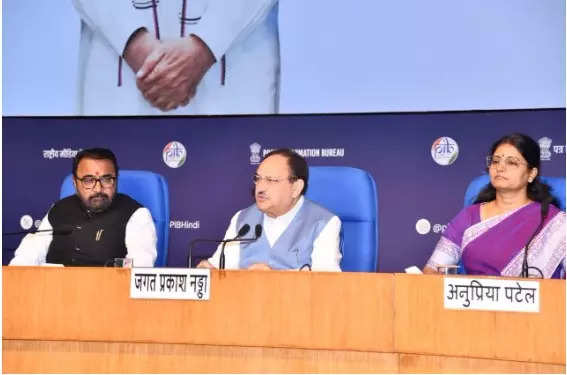
New Delhi: The Union Minister of Health and Family Welfare, JP Nadda highlighted the key achievements of the Union Health Ministry in the first 100 days of the newly formed government.
The Union Health Minister noted that around Rs 15 lakh crore of investment have been made in the last 100 days with speed and scale across different ministries. He noted that the Ministry of Health and Family Welfare has launched several key initiatives aimed at enhancing healthcare delivery and access in India. The following are some of the achievements made in the last 100 days across different health schemes:
Nadda said, the recent announcement of expansion of the Ayushman Bharat PMJAY scheme to include all senior citizens, irrespective of income group, aged 70 years and above will potentially benefit around six crore individuals across 4.5 crore families. Highlighting that Ayushman Bharat is the world’s largest publicly funded health coverage programme, Nadda informed that the expanded scheme will be implemented from October this year.
“The U-WIN portal has been developed for full digitisation of vaccination services for complete vaccination record of pregnant women and children from birth to 17 years under the Universal Immunisation Programme”, he informed that the portal is already operational on pilot basis. As on September 16, 2024, 6.46 crore beneficiaries have been registered, 1.04 crore vaccination sessions have been held and 23.06 crore administered vaccine doses have been recorded on the portal,” the release stated.
New TB treatment regimen & Made-in-India TB diagnostics:
A shorter and more efficacious treatment regimen is now available for use under the National TB Elimination Programme (NTEP) which would help in reducing the treatment duration from 9-12 months to six months. It has been validated along with Health Technology Assessment (HTA) by ICMR. Nadda informed that the Union Health Ministry in consultation with the State/UT governments is preparing a detailed rollout plan for logistics and training of health professionals for the introduction of this new regimen early next year. He also highlighted the expected reduction in duration of the treatment regimen in approximately 75,000 DRTB cases across the country.
In order to ensure country wide coverage for TB and drug resistance diagnosis by ‘state of the art’ molecular methods, a new indigenous diagnostic system (Patho detect) has been validated by ICMR, along with field feasibility. Nadda stated that it would lead to reduction in turn-around times for test results, thereby reducing morbidity and mortality of TB patients.
Deployment of BHISM Cubes:
BHISHM Cubes are portable and rapidly deployable modular medical facility intended to provide emergency lifesaving clinical care in event of disaster/public health emergencies. The Union Health Minister stated that BHISM Cubes have the capacity to handle about 200 cases of diverse nature in emergency situations such as trauma, bleeding, burns, fractures, etc. In the first phase, BHISHM Cubes will be placed in 25 AIIMS and Institutes of National Importance (INIs) for rapid deployment in the respective region in case of disaster/health emergencies. States may also deploy at strategic locations subsequently. India has gifted four BHISHM Cubes to Ukraine during the Prime Minister’s visit to the country recently.
Use of drone services:
Drones service aid in rapid, cost-effective and safe delivery of medical supplies and samples in hard-to-reach and tough terrains. Fifteen (15) AIIMS/INIs/NE institutions have been identified for drone services. Drone trials and trainings have been completed in 12 institutes. Nadda said that drones provide safe, accurate reliable pickup & delivery of medicines, vaccines, blood, diagnostic specimens & other life-saving items to difficult-to-reach facilities.
Medical education:
The Union Health Minister said that the increase in medical colleges and MBBS and PG seats would lead to increase in the availability of doctors in the healthcare system.
There is an increase of 8.07 per cent in medical colleges from 706 in 2023-24 to 766 in 2024-25. There has been 98 per cent increase in medical colleges from 387 in 2013-14 to 766 in 2024-25. During the same period, 379 new medical colleges have been established and, presently there are 766 (Govt: 423, Pvt: 343) medical colleges in the country.
There is an increase of 6.30 per cent in MBBS seats from 1,08,940 in 2023-24 to 1,15,812 in 2024-25. MBBS seats increased by 64,464 (ie, 125 per cent ) from 2013-14 (51,348 seats) to 2024-25 (11,5812 seats).
Increase in PG seats:
There is an increase of 5.92 per cent in PG seats from 69,024 in 2023-24 to 73,111 in 2024-25. During the last ten years, the number of PG seats increased by 39,460 (ie, 127 per cent) from 2013-14 (31,185 seats) to 2024-25 (73,111 seats).
Operationalisation of National Medical Register:
National Medical Register (NMR) is a comprehensive dynamic database for all allopathic (MBBS) registered doctors in India. NMR is linked with Aadhaar ID of the doctors that ensures the individual’s authenticity.
Nadda said that NMR being a key component of the country’s Ayushman Bharat digital mission, it would be part of Healthcare Professional Registry (HPR). He further said that NMR will ensure provision of data covering details of around 13 lakh doctors in the country – state-wise, those who have left the country, those who have lost their license to practice, or details of doctors who have lost their lives.
Virtual National Quality Assurance Standards (NQAS) Assessment of Ayushman Arogya Mandir -Sub Centre:
NQAS are set of standards designed to ensure and improve the quality of healthcare services in district hospitals, community health centres, Ayushman Arogya Mandir – Primary Health Centre, Ayushman Arogya Mandir – Urban Primary Health Centre and Ayushman Arogya Mandir – Sub Health Centre.
Nadda said that as on August 31, 2024, 13,782 public health facilities are NQAS certified. A total of 5,784 public health facilities have been NQAS certified from April 1, 2024 till date, in which 3,134 facilities (including 2,734 Ayushman Arogya Mandir – Sub Centres) have been NQAS certified at all levels in the first 100 days.
The virtual National Quality Assurance Standards assessments for Ayushman Arogya Mandir-Sub Centres commenced on August 1st after requisite trainings. 58 assessments have been done, with 104 more assessments scheduled to take place by end of September, 2024. “This will give an impetus to ensuring quality standards for all levels of public healthcare facilities improving comprehensive primary healthcare of citizens” said Nadda.
National Quality Assurance standards for integrated public health laboratories:
Release of NQAS for IPHLs spread across district level health facilities is aimed at improving the quality and competence of management and testing systems in IPHLs. This will positively impact the reliability of test results and enhance the quality of diagnostics & patient care.
Establishment of AIIMS in Darbhanga:
Union Cabinet has approved setting up of new AIIMS at Darbhanga on September 15, 2020 at an estimated cost of Rs 1264 crore. Nadda stated that the issue of allotment of land for AIIMS Darbhanga, which was pending for over three years has been finally settled and the Government of Bihar has allotted and since handed over 150.13 acres of land on August 12, 2024 required for AIIMS Darbhanga. He further noted that AIIMS institutions would serve to fill the gap in affordable tertiary healthcare services and reduce out of pocket expenditure.
Completion of Super Specialty Blocks:
Completion of construction works of Super Specialty Blocks (SSB) has been taken up as upgradation projects of existing government medical colleges under PMSSY of four government medical colleges in Bihar, comprising, Jawaharlal Nehru Medical College, Bhagalpur, Anugrah Narayan Magadh Medical College, Gaya, Sri Krishna Medical College, Muzaffarpur, Darbhanga Medical College and Hospital.
The launch of Super Specialty Blocks in government medical colleges (Bihar) would serve to fill the gap in affordable tertiary healthcare services and reduce out of pocket expenditure, Nadda highlighted.
Nadda also highlighted the introduction of the Food Import Rejection Alerts (FIRA), an online portal designed to notify the public and relevant food safety authorities about food import rejections at Indian borders and training of food street vendors by the FSSAI.







